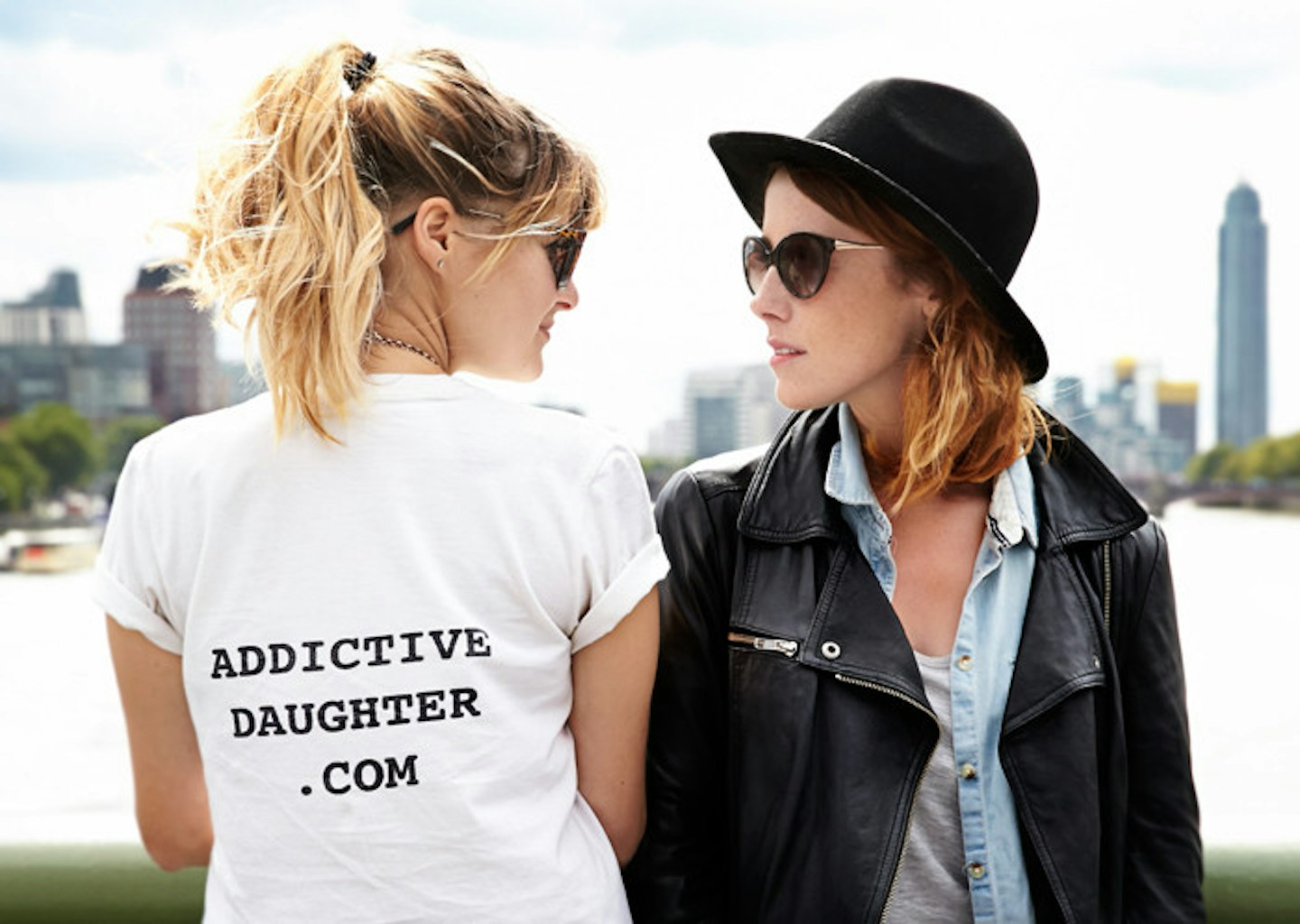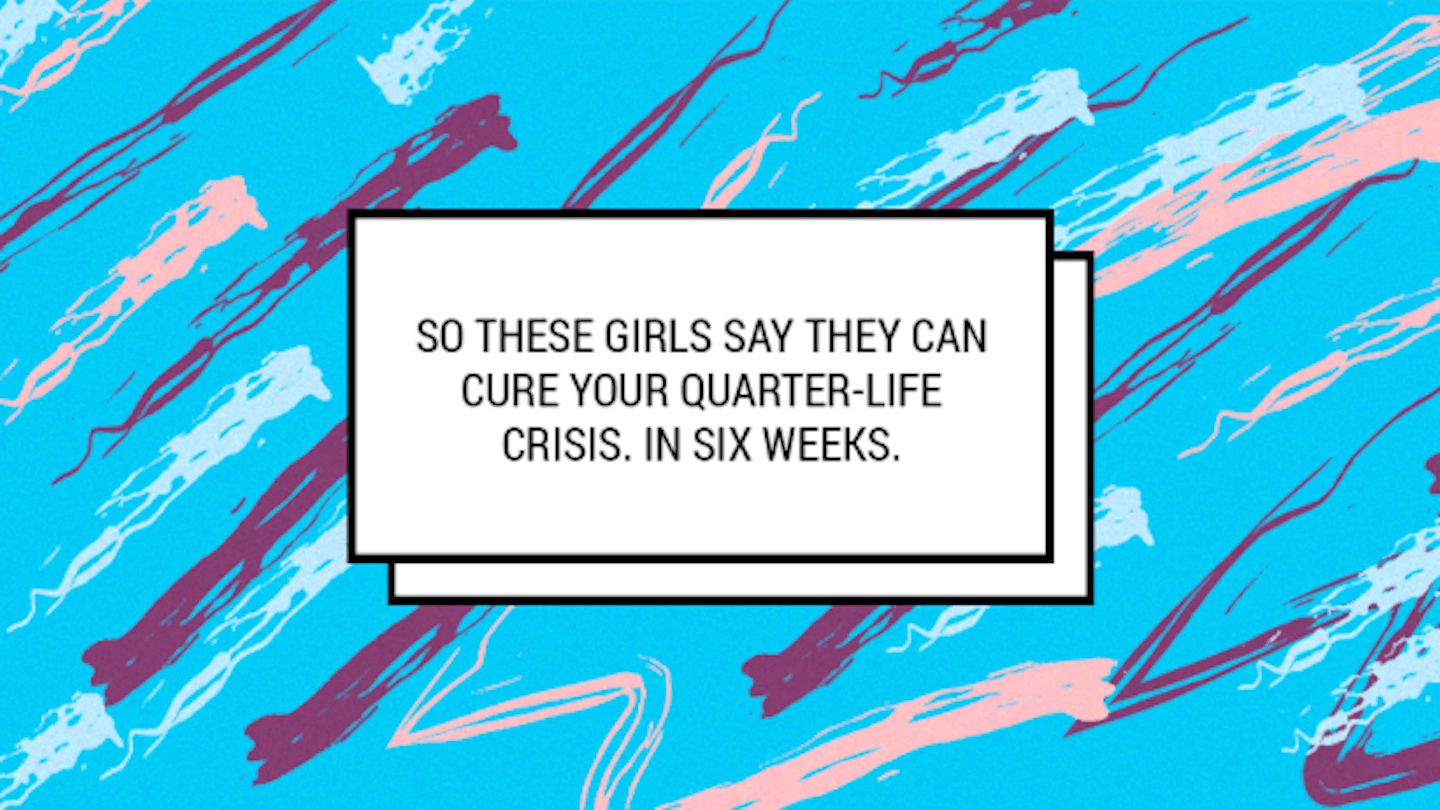You’re panicking, you’re dating the wrong people, you’ve never got enough money until somehow you spend it all on drinks and a lot of stomach-churningly-swervy taxi rides… And the worst part of all is that no way should you be doing this because you’re in your mid-20s, for fuck’s sake. This is when you’re meant to have it all figured out, right?
But no, we’re still muddling through, suffering with what is now uniformly and definitively known as the Quarter Life Crisis, or QLC. 'It's when you’re stuck in a job you hate but can’t bear to leave, too scared to look at your finances, commited to staying in your overdraft, drinking and taking drugs to escape and in a succession of toxic relationships,’ says Persia Lawson – the 27-year-old who promises she’s got the solution. Because, along with best friend Joey Rayner, 28, Persia has set up Addictive Daughter, a service that vows to ‘cure your QLC’.

READ MORE: You’re Not Meant To Be Depressed At Uni But It’s A Breeding Ground For Sadness
It all started when Persia and Joey, both drama school graduates who had seen their friends excel where they hadn’t (Persia’s close friend Vanessa Kirby is a theatre, film and TV actress, while Joey is close friends with Game Of Thrones’ Emilia Clarke), bonded over the fact they were both dating drug addicts. ‘Both had been in rehab and were now sober, but I think mine was being sneaky behind my back,’ Persia tells The Debrief. ‘He dumped me, and so I called Joey to say: “I know we haven’t spoken in months" (we’d had a falling out over a boy) “but I’ve just been dumped” and she said: “No way! Me too!” We thought, we can either go on not sorting out our shit, or put the same amount of energy that we’ve been putting into making a mess of ourselves into being positive. It was like a self-made rehab.’
The pair realised that there was nothing out there specifically aimed for women like them; women going through a QLC. So Addictive Daughter was born.
A few months later, as well as cutting down on booze, drugs and bad boys, they’d ‘read every self-help book you can imagine,’ watched seminars and TED talks, changed their diets and began exercising more. ‘We became happy so quickly,' Persia remembers. But crucially, the pair also realised that there was nothing out there specifically aimed for women like them; women going through a QLC. So Addictive Daughter was born.
Today their website has 3,000 subscribers, around 6,000-10,000 visits per month and a widening client base. Persia and Joey do talks around the country, write columns for magazines and go into marketing meetings to help explain the QLC to the suits. At the bare bones, though, their QLC intensive course is a six-week series of hour-long conversations with Joey or Persia, who take you through different aspects of your life – relationships, work, health and fitness etc in a bid to tackle each problem head-on. You can chat IRL, or over Skype, and then there's also a catch-up phone call per week. They also encourage healthy eating, working out and meditation to help transfer bad habits into good.
So were people really crying out for this service? Well, yes. Though feeling freaky around 25 has happened for decades, QLCs are affecting a lot more people right now. Dr Oliver Robinson, from the University of Greenwich, who wrote Development Through Adulthood, explains: ‘If you ask people in their 70s, 20 per cent of them say they have had a QLC. But people who are just past their 20s will say they had a tangible and lengthy QLC.’
Persia has her own theories on why today's 20-somethings are the biggest sufferers of the QLC. ‘The stiff upper lip mentality still exists, that’s why the UK has the highest rate of female alcoholics and the highest rate of addicts in all of Europe. I think it’s because we repress our emotions and don’t deal with things, so turn to drink for escapism.’
READ MORE: Ask An Adult: When Are Post-Holiday Blues A Sign Of Something More Serious
But what are we escaping from? Haven’t we got it all? Thanks to technological advances, our lives are efficient in ways our parents could only have dreamed of, and, particularly for women, there's much less pressure on when we’ll set down those presumed milestones of adulthood, like weddings, babies and so on. Persia attributes this worsening of the QLC to two main things; the remnants of a recession that’s left so many young people out of work, and social media. ‘Being told we’re not going to earn as much as our parents makes us realise that we’ve got used to a style of living we’re unable to afford and we won’t get on the property ladder.’
The stiff upper lip mentality still exists, that’s why the UK has the highest rate of female alcoholics and the highest rate of addicts in all of Europe.
As for social media? Well, though Persia uses it to keep Addictive Daughter’s 3,000 Twitter followers up to date with their Life Nuggets – YouTube tutorials where Joey and Persia talk about eg 'The Trick to Manifesting Your Ideal Lover (Or Anything Else),' 'How To Attract The Good & Repel The Bad' – she believes it's also fuelling our FOMO. ‘Social media is everyone’s highlights reel, it doesn’t show people in debt or fucking miserable, which means we go into complete compare and despair, we compare our reality to people’s amazing lives and end up thinking ours isn’t good enough.’
In fact, social media is so alluring that she has to go cold turkey every now and then. ‘Though Tweeting can be a positive cause, I find it so addictive. I took myself off to the park for three hours earlier, just thinking “This is what people used to do!”’
All of which sounds very sensible. But how can two women, both in their 20s, perhaps still in the midst of their own bad habits or anxieties, be equipped to pull the rest of us out of a rut that we never created in the first place?
‘We’re not gurus, we’re not perfect, we just know there’s a way of interpreting what might be a negative situation instead of just getting fucked and not dealing with it,' explains Persia. 'This summer, I went to festivals; I partied, I danced and I was almost scared that I would slip back into old habits. But I now trust myself, even if I fuck up, it’s OK – I can get back on track, it’s fine and it’s not the end of the world.’
READ MORE: Where Does Our Obsession With Being "Little Miss Perfect" Come From?
The newfound belief Persia has in herself, the meditation, the self-improvement, addressing vices (‘We don’t preach abstinence’)… it all sounds like religious ideals made universal. ‘I always shy away from the word religion as it’s scary but it is spiritual. As a generation we keep trying to change the outer; “I’ll be happy if I get that” or “If that happens, then I’ll be happy.” And we’re not questioning what’s beneath it; which is, when you don’t feel good about yourself, you’re self-destructive, and when you’re self-destructive, you don’t feel good about yourself.’
Though tweeting can be a positive cause, I find it so addictive. I took myself off to the park for three hours earlier, just thinking “This is what people used to do!”
One person who says Addictive Daughter's programmes have really helped her is 28-year-old Hattie Rykens – who, funnily enough, found out about the services via her mum. ‘She emailed to say: “Oh my god darling, here’s this company they’ve just found it’s so up your street.” She knew that I’d been going through stuff and I’d been umming and ahhing whether I wanted to go back to traditional therapy.’
Having spent seven months in rehab (she’s been attending AA for five years since), she’s got nothing bad to say about her experiences of traditional therapy. It’s just that, in her mid-20s, she wanted to focus on the present. ‘I’d sat in the room, I’d drudged up my past, I’d faced my demons around all of those areas. What I wanted was something that was more present, dealing with the day-to-day. It was "How do I manage my worklife?” "How do I look at my relationships but not every time have to link it back to whatever happened in my past?’’’
She spent £500 on Addictive Daughter’s QLC Intensive Programme, and worked with them for six weeks, spending each one focusing on a different segment of her life – relationships, health, spirituality, work, and so on. 'It sounds a bit corny but I’d go as far as saying life-changing, it was a kick-starter that I definitely needed instead of sitting in that funk of life where I wasn’t really living,’ she recalls.
This interaction, with people young women can relate to, is why some doctors agree there's a place for services like those offered by Persia and Joey alongside the mainstream health service offerings. ‘A doctor having no clue about human development, gives them a static label like “depression” then it’s seen as an illness and it’s on their record for life,' says Dr Robinson. 'That’s where an intermediary world of coaching and self-help and workshops that can potentially be a good thing. ‘
Persia insists that while she and Joey have recieved life-coaching diplomas, she's aware she can't help in every case. ‘We have to use our common sense and discernment, but there hasn’t been a case where we’ve thought, “we can’t help here.” If someone was suicidal or having severe panic attacks we would advise them to seek medical help.’
It sounds a bit corny but I’d go as far as saying life-changing, it was a kick-starter that I definitely needed.
But she believes the pair offer an alternative service. ‘When things are institutionalised, it can add value, but lose people; we want to speak to girls in their own language. Teachers can be effective if they’re passionate about something, but if they’re not, they won’t care. Me and Joey are passionate about this.’
It might be easy to decry the motives of two 27-year-olds who talk about 'giving the universe signals' and telling wolf-whistlers 'thanks guys!' and to 'give it back to them in a loving way… it makes you look silly if you get your knickers in a twist' making £1,000 a month from talking to clients about their issues (money which, incidentally, they’re pumping back into the company). But in a scenario where, the ONS reports, a quarter of young British women will now report symptoms of anxiety or depression, compared to 16 per cent of the general population – it's much more productive to see the use in anything trying to get us back on an even keel. Especially when you consider the stigma attached to admitting a fully-fledged mental illness, despite many young women's anxieties potentially being caused by environmental factors.
As Persia puts it: ‘I think kids should be meditating, and schools teaching them to respect or love yourself – we’re pushing for that to be on the school curriculum, not something we have to learn when adult life kicks in in our 20s.’
Like this? Then you might also be interested in:
Things You Only Know If You've Been An In Patient At The Priory
Follow Sophie on Twitter @sophwilkinson
This article originally appeared on The Debrief.
